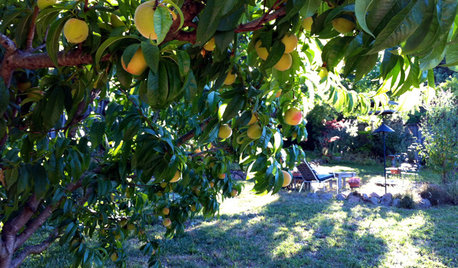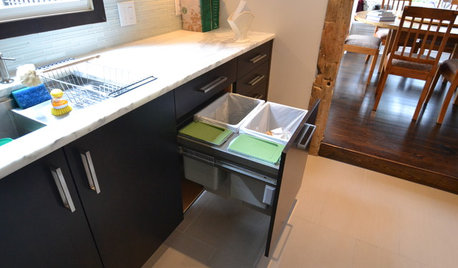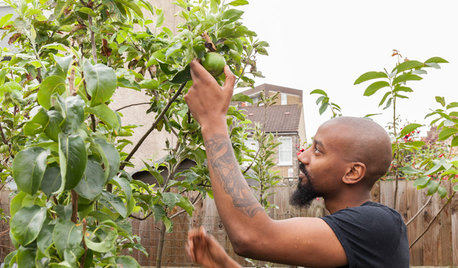help with fruit flies/fungus gnats in compost
nancybeetoo
15 years ago
Featured Answer
Sort by:Oldest
Comments (45)
dchall_san_antonio
15 years agoval_s
15 years agoRelated Discussions
help - flies (bad) and worms (good) in compost bin
Comments (12)Me the OP again. I'd be hesitant to use a mosquito dunk b/c of the worms and b/c I try to keep things organic (the compost gets used on my vegetable gardent). Here's what I did exactly - tumbled the compost as usual. Then I scattered some old sawdust over the top so that there was a thin layer everywhere - just enough so that you couldn't make out the veggie peels, etc. underneath. I imagine that dried leaves, straw, or even dried mulch would work as well....See Morefruit flies and fungus gnats
Comments (6)I thought houseflys were not supposed to go above 10 feet thus the hanging of meat high to age. The old wives tale must not be correct. Or maybe that is mosquitoes. For Fungus gnats I suggest DDT. Fungus gnats are evil. Hopefully what works for fruit flys will also work for fungus gnats. We are going to try a multi pronged approach. We are going to hit them with everything we got all at once for the win. While covering with bedding is a great idea... I have seen the little buggers hatch and pass on up out of that covering of bedding. You may want to consider temporarily freezing and blending in no particular order their food. Food can also be wrapped in newspaper or put into a bag with a rolled closed top. This is added to the bin. A shear curtain type material can be put on top of the bin. At night the computer screen attracts them. Or any window with light. I am now used to a quick scan across the top of my wine glass before each sip. A quick dip of a finger tip targeted into the glass will find a drop of wine with the victim captured. Maybe stop adding any food at all for a few weeks. Freeze it for later. Fruit flys seem attracted to the top of pillars. Especially white pillars. A glass you never expect to drink out of with an inch of your finest wine, believe me they always go for the good stuff first, and a well mixed in drop of detergent place on top of the pillar will over the course of a month attract and drown an inch of fruit flys. Unfortunately they do not swarm in immediately. It is fun to watch and very satisfying to see each fruit fly that goes for the big swim. Don't tell PETA. Now that would be a science experiment. Do fruit flys go for the $50 bottle instead of the $5 of wine. :-) A new wine rating system. On the other hand even the fruit flys are helping to do the work of composting and getting the material good and yummy for the worms. As long as their little bodies die inside the compost bucket the value stays in....See MoreBug Zapper For Killing Fungus Gnats / Fruit Flies?
Comments (7)I dont know about outside but inside the ole "apple cider vinegar" works like a charm for fruit flies. I put a little in a dish/bowl , add a drop of dish soap, cover with cling wrap and punch tiny holes for the flies to enter, they will go in but wont come back out. Place near where they are congregating even if its right on your worm bin . This does not work for gnats. Its also easy to tell which you have. Gnats are slow long legged fliers and fruit flies are fast fliers. It seems the FF are the ones attracted to the worm bins as they try to lay eggs in the food you put in thats why its important to cover with a nice layer of shredded paper each time....See Morefruit flies/gnats
Comments (20)I hope it's okay to resurrect an old thread, but I have a question re mesh screen and fruit flies ... From this page here, http://homeguides.sfgate.com/determine-mesh-size-window-screen-25184.html, we can calculate how tight a mesh screen is by cutting out a 1 square in piece of fiberglass or other mesh screen and counting how many holes there are in that square inch to figure out the "density" or frequency of the holes to determine the size. But what size will actually keep out fruit flies, anyone know? I don't actually know the size of mesh screen holes that will keep these pesky flies out. Does anyone? I've looked and looked on the net but haven't found a thing. I brought home a roll of figerglass mesh home from my local hardware store but took it back yesterday because it seemed the holes were big enough for the flies to get through. At any rate, didn't want to risk it so didn't open package as the mesh wasn't cheap. Before I go out and buy again, want to know best size to use. Thanks for any help re this! :D...See Morelouisianagal
15 years agoval_s
15 years agodavid52 Zone 6
15 years agojoepyeweed
15 years agoKimmsr
15 years agotiffy_z5_6_can
15 years agojean001
15 years agoval_s
15 years agoLloyd
15 years agoval_s
15 years agoKimmsr
15 years agoval_s
15 years agojoepyeweed
15 years agoKimmsr
15 years agoval_s
15 years agoflora_uk
15 years agoval_s
15 years agodchall_san_antonio
15 years agoKimmsr
15 years agojoepyeweed
15 years agoval_s
15 years agoLloyd
15 years agoLloyd
15 years agoajpa
15 years agoval_s
15 years agojoe.jr317
15 years agoval_s
15 years agoLloyd
15 years agonancybeetoo
15 years agosoilguy
15 years agojoe.jr317
15 years agojoepyeweed
15 years agodavid52 Zone 6
15 years agodchall_san_antonio
15 years agosoilguy
15 years agoKimmsr
15 years agojoepyeweed
15 years agosoilguy
15 years agoKimmsr
15 years agoval_s
15 years agosoilguy
15 years agoled_zep_rules
15 years ago
Related Stories

MOST POPULARHow to Get Rid of Those Pesky Summer Fruit Flies
Learn what fruit flies are, how to prevent them and how to get rid of them in your home
Full Story
GARDENING GUIDESGet on a Composting Kick (Hello, Free Fertilizer!)
Quit shelling out for pricey substitutes that aren’t even as good. Here’s how to give your soil the best while lightening your trash load
Full Story
MOST POPULAR7 Ways to Design Your Kitchen to Help You Lose Weight
In his new book, Slim by Design, eating-behavior expert Brian Wansink shows us how to get our kitchens working better
Full Story
GARDENING GUIDESHow to Keep Your Citrus Trees Well Fed and Healthy
Ripe for some citrus fertilizer know-how? This mini guide will help your lemon, orange and grapefruit trees flourish
Full Story
EDIBLE GARDENSHow to Grow Your Own Peaches and Nectarines
Make gardening a little sweeter with these juicy fruits, which you can eat after plucking or preserve for later
Full Story
GARDENING GUIDESHouzz TV: Make a Worm Bin for Rich Soil and Happy Plants
A worm-powered compost bin that can fit under a sink turns food scraps into a powerful amendment for your garden. Here’s how to make one
Full Story
SHOP HOUZZShop Houzz: 4 Ways to Show You Really Love Our Planet
Compost, recycle and save water and energy with these earth-loving picks
Full Story
GARDENING GUIDESLush, Foodie Abundance in a Small Urban Garden
This modest backyard garden provides its owner with fruit and vegetables all year round, thanks to an innovative low-maintenance approach
Full Story
FARM YOUR YARDHow to Grow Vegetables in Containers
Get glorious vegetables and fruits on your patio with a pro’s guidance — including his personal recipe for potting mix
Full Story
EDIBLE GARDENSHow to Grow Your Own Sweet Summer Crops
This guide will help any gardener get started on growing the freshest warm-season veggies and berries for summer
Full Story


Kimmsr